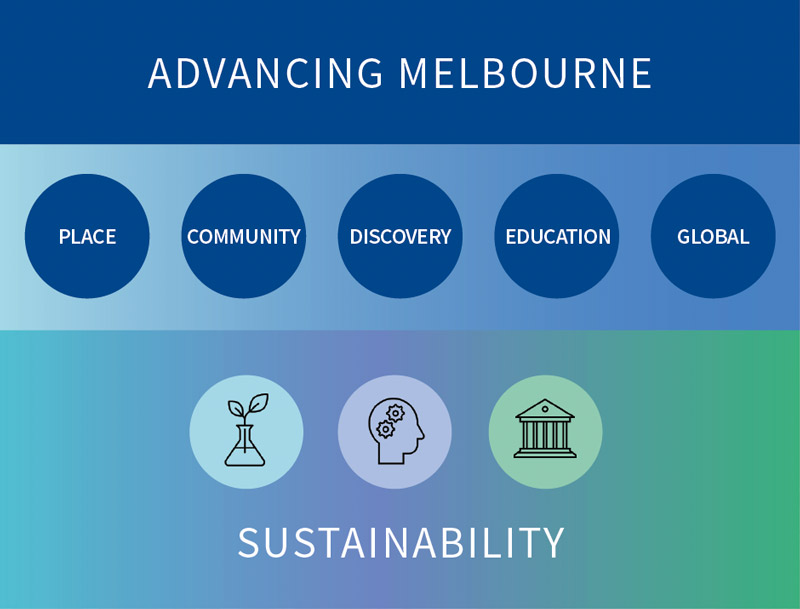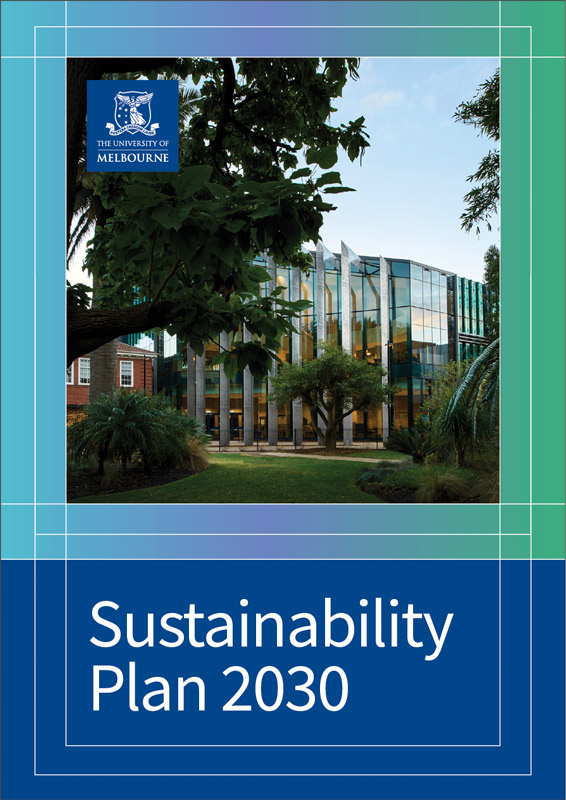Sustainability Framework
Sustainability at Melbourne is governed by the University’s Sustainability Framework, comprising the three elements below:
Sustainability Plan 2030
Sustainability Reports
The urgent and complex challenges of global sustainability demand action. This decade to 2030 is the critical window if society is to limit global warming to 1.5°C.

spanning all themes
The Plan's three domains describe our strategic approach to accelerating society's transition to sustainability.
Amplifying action through campus and communitiesThis domain amplifies impact through purposeful collaboration and cross-pollination of the other two domains: Mobilising knowledge for action and Walking the talk in our operations. It includes the following priority areas: |
- The University is certified carbon neutral by 2025
- The University has achieved climate positive status
by 2030.
- The University has curated living labs covering the priority areas of this Plan.
- The University's Academic Divisions and portfolios support and learn from each other to embed sustainability in practice and in learning – formal, non-formal and informal
- The University community shows increased uptake of positive sustainability skills, knowledge and behaviours through non-formal and informal learning
- The University offers a suite of student-centered, formal and non-formal applied sustainability learning opportunities, informed by inter and trans-disciplinary approaches
- Academic and professional staff have increased their participation in and contribution to formal and non-formal learning to develop their general and roles-pecific sustainability skills
- The University has increased its engagement with alumni regarding sustainability.
Mobilising knowledge for actionA deeply collaborative approach to producing, sharing and implementing practical sustainability knowledge is the Sustainability Plan 2030’s most critical success factor. This domain includes the following priority areas: |
- Sustainability is integrated into curriculum to an extent that conscientiously extends, beyond a base threshold, each discipline’s (and associated professions/industries’) knowledge of the helpful and harmful impacts it has for the environmental and human systems we depend on
- Graduates have increased capabilities to shape, lead and succeed in the careers, communities and industries of sustainable societies (year on year).
- Sustainability research is integrated with campus operations and planning, to be an international exemplar of a sustainable community
- The highest quality research is conducted that contributes to knowledge, action, and impact across the disciplinary and interdisciplinary dimensions of sustainability
- Researchers make considered decisions on the sustainability impact of their research practices and activities.
- The University has an increased understanding of sustainability from an Indigenous perspective through co-created or Indigenous-led reciprocal learning.
- The University’s community partnerships demonstrate localised and co-created approaches to sustainability
- The University has led or influenced discussions with precinct partners to further precinct-specific approaches to sustainability
- The University is playing a leading and convening role on sustainability challenges and opportunities internationally, with particular focus on vulnerable and disadvantaged people in Asia and the Pacific.
Walking the talk in our operationsThis domain reflects the University of Melbourne's ambition to become a true exemplar of sustainable community, supporting and enhancing the ecosystems, networks and communities our campuses form part of, at scales from local to global. It includes the following priority areas: |
- The University reaches and maintains a 'high' climate change preparedness level.
- Each campus achieves no net loss of biodiversity relative to defined baseline years by 2025
- Each campus achieves an increase of biodiversity relative to defined baseline years by 2030.
- The University has reduced total water consumption by 10% relative to a 2019 baseline
- The University has significantly increased the proportion of water consumption from non-potable sources compared to a 2019 baseline.
- The University has reduced waste to landfill to 10kg per person
- The University has reduced the flow and improved the circularity of materials passing through the University
- The University has principles for ethical and sustainable consumption and service provision embedded into operations and procurement practices
- The University tracks spend with social and Indigenous suppliers, setting targets from 2024.
- The University’s investment portfolio will be included in our commitment to be climate positive by 2030
- Enhanced transparent reporting of the University’s investment portfolio.
Contact
For queries or to provide feedback on our sustainability framework, please contact us at:
sustainability-2030@unimelb.edu.au
